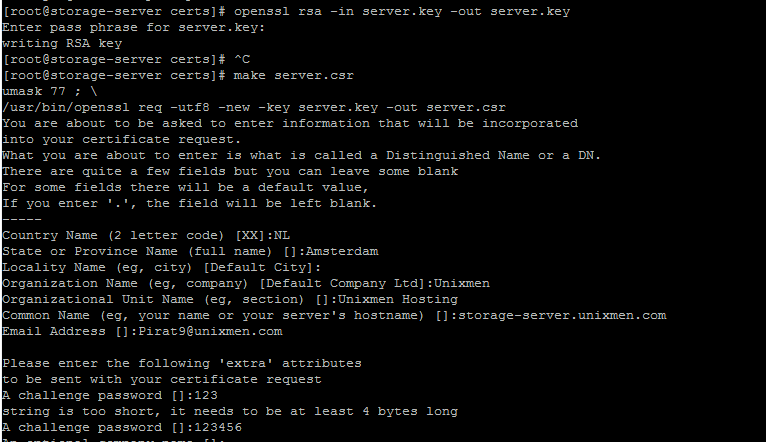Openssl Commands To Generate Private Key Without Passphrase
One of the most versatile SSL tools is OpenSSL which is an open source implementation of the SSL protocol. There are versions of OpenSSL for nearly every platform, including Windows, Linux, and Mac OS X. OpenSSL is commonly used to create the CSR and private key for many different platforms, including Apache. However, it also has hundreds of different functions that allow you to view the details of a CSR or certificate, compare an MD5 hash of the certificate and private key (to make sure they match), verify that a certificate is installed properly on any website, and convert the certificate to a different format. A compiled version of OpenSSL for Windows can be found here.
If you don't want to bother with OpenSSL, you can do many of the same things with our SSL Certificate Tools. Below, we have listed the most common OpenSSL commands and their usage: Freemake video downloader premium pack serial key generator.
General OpenSSL Commands
This module allows one to (re)generate OpenSSL private keys. One can generate RSA, DSA, ECC or EdDSA private keys.; Keys are generated in PEM format. Please note that the module regenerates private keys if they don’t match the module’s options. With your private key in hand, you can use the following command to see the key's details, such as its modulus and its constituent primes. Remember to change the name of the input file to the file name of your private key. $ openssl pkey -in private-key.pem -text The above command yields the following output in my specific case. It is also easy to generate random passwords and passphrase on the command line. This can be done with basic Unix commands. The generated passphrases are too complex to remember, but are very useful for applications where passphrases are needed for protecting machine keys and for SSH key management. Oct 09, 2019 OpenSSL has a variety of commands that can be used to operate on private key files, some of which are specific to RSA (e.g. Openssl rsa and openssl genrsa) or which have other limitations. Generate rsa public key windows 7. Here we always use openssl pkey, openssl genpkey, and openssl pkcs8, regardless of the type of key.
I'm using openssl to sign files, it works but I would like the private key file is encrypted with a password. These are the commands I'm using, I would like to know the equivalent commands.
These commands allow you to generate CSRs, Certificates, Private Keys and do other miscellaneous tasks.
- Generate a new private key and Certificate Signing Request
- Generate a self-signed certificate (see How to Create and Install an Apache Self Signed Certificate for more info)
- Generate a certificate signing request (CSR) for an existing private key
- Generate a certificate signing request based on an existing certificate
- Remove a passphrase from a private key
Checking Using OpenSSL
If you need to check the information within a Certificate, CSR or Private Key, use these commands. You can also check CSRs and check certificates using our online tools.
Openssl Commands To Generate Private Key Without Passphrase Change
- Check a Certificate Signing Request (CSR)
- Check a private key
- Check a certificate
- Check a PKCS#12 file (.pfx or .p12)
Debugging Using OpenSSL

If you are receiving an error that the private doesn't match the certificate or that a certificate that you installed to a site is not trusted, try one of these commands. If you are trying to verify that an SSL certificate is installed correctly, be sure to check out the SSL Checker.
- Check an MD5 hash of the public key to ensure that it matches with what is in a CSR or private key
- Check an SSL connection. All the certificates (including Intermediates) should be displayed

Converting Using OpenSSL
Openssl Commands To Generate Private Key Without Passphrase Change
These commands allow you to convert certificates and keys to different formats to make them compatible with specific types of servers or software. For example, you can convert a normal PEM file that would work with Apache to a PFX (PKCS#12) file and use it with Tomcat or IIS. Use our SSL Converter to convert certificates without messing with OpenSSL.
- Convert a DER file (.crt .cer .der) to PEM
- Convert a PEM file to DER
- Convert a PKCS#12 file (.pfx .p12) containing a private key and certificates to PEM
You can add -nocerts to only output the private key or add -nokeys to only output the certificates.
- Convert a PEM certificate file and a private key to PKCS#12 (.pfx .p12)
Openssl Generate Keypair
Originally posted on Sun Jan 13, 2008